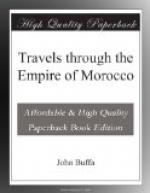In the morning, after prayer, they drink strong tea, which they prefer to coffee. At eleven o’clock they, go to dinner, which consists of fruits, sweetmeats, and their favourite cous-ca-sou, piled up in a large wooden bowl. Their chief meal is after their return from evening prayer. They eat cakes made of fine wheaten flour; and as they consider it a crime to cut bread or meat of any kind after it is dressed, these cakes are made so thin that they may be easily broken with the hands; and their meat, which is generally mutton or fowls, is so prepared that they can without difficulty separate it from the bones with their fingers. They sit cross-legged upon cushions, and devour their food very greedily and without the least ceremony. Although sobriety is strictly enjoined by the Mahometan law, yet the Moorish inhabitants of the principal towns in Barbary make free with most excellent wines and spirits of their own manufacture.
The revenues of the Emperor have of late augmented prodigiously. He receives a tenth part of all the property of his Mahometan subjects; and he compels every Jew residing in his dominions to pay a poll-tax of six crowns annually. The number of Israelites subject to the Emperor of Morocco exceeds one hundred thousand. They are strictly guarded, and cruelly oppressed, and are not permitted to quit the states without a special leave from the Emperor, to obtain which they are obliged to pay down a large sum of money.
The authority of the Emperor is unlimited, as is that of his Governors, who possess a power of life and death. No rank nor condition of Moors is exempt from taxation, excepting the immediate princes of the blood, and the Xeriffes, which are the only degrees of nobility the Moors have. The Xeriffes are the descendants of their monarchs, and their titles are hereditary: but the title of Sheik is temporary; so that the respect paid to the Sheiks on account of their high situations expires with them.
Coaches, carriages, and palanquins are used only by the Emperor. I have seen some, both here and at Fez, which are really elegant; they are for the use of his ladies when they go to spend the day in any of the Imperial gardens. The Emperor has several very handsome chariots, in one of which he usually rides, drawn by six mules. The Moors ride on horseback, attended by a number of slaves or soldiers, according to their rank and wealth.
The princes of the blood and Xeriffes are not allowed to interfere in any political or public business, and are never consulted in state affairs. They are generally provided for, with sinecure places to support their rank, but many of these are too small to enable them to do so. The several Governors of provinces have each a large tract of land; and the tax collected from the venders and buyers in the weekly markets in their districts is also appropriated by them to defray the charges of their retinue and troops. From the vast crown lands in this country,




